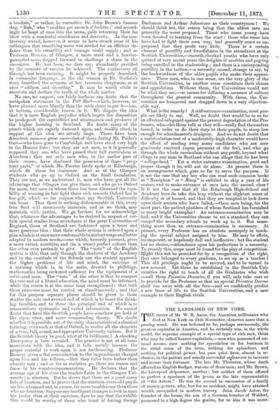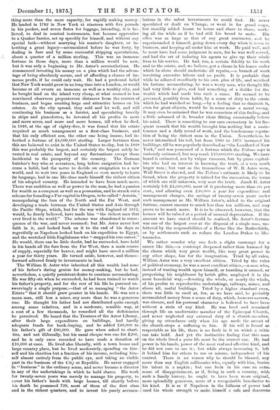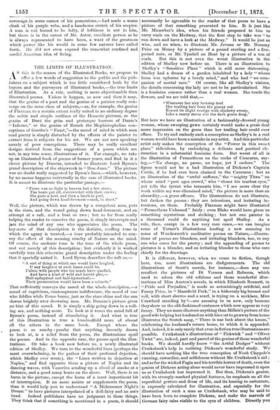THE LANDLORD OF NEW YORK.
THE career of Mr. W. B. Astor, the American millionaire who died at New York on 24th November, deserves more than a passing word. He was believed to be, perhaps erroneously, the greatest capitalist in America, and he certainly was, in the whole world, the supreme example of a special type of rich men, those who may be called beaver-capitalists,—men who, possessed of un- usual means, care nothing for speculation or for business in the usual sense of the term, nothing for splendour, and nothing for political power, but pass quiet lives, almost in se- clusion, in the patient and usually successful endeavour to increase and secure their fortunes. The late Mr. Thornton, whose death affected an English Budget, was one of these men ; and Mr. Brown, the Liverpool shipowner, another ; but neither of them offered so perfect a specimen of the genus as the late representative of "the Astors." He was the second in succession of a family of money-getters, who, but for an accident, might have attained wealth unequalled in modern history. John Jacob Astor, the founder of the house, the son of a German butcher of Waldorf, possessed in a high degree the genius, for in him it was some- thing more than the mere capacity, for rapidly making money. He landed in 1782 in New York at nineteen with five pounds in his pocket, and seven flutes for luggage, intending, it is be- lieved, to deal in musical instruments, but became apprentice to a Quaker furrier, set up speedily for himself, and without any special luck—without marrying his master's daughter, or in- heriting a great legacy—accumulated before he was forty, by dealing in furs and by some successful shipping speculations, about a quarter of a million sterling. This was an immense fortune in those days, more than a million would be now, but it was only a beginning to Mr. Astor's accumulations. He commenced investing his money on a plan which had the advan- tage of being absolutely secure, and of affording a chance of im- mense profit, if he could only wait. He had a profound belief that New York would grow in no long time into a London, or would become at all events an immense as well as a wealthy city, and he bought land on the island very cheap, at what seemed to less convinced observers preposterous distances from the centres of business, and began erecting large and attractive houses on his estates. As the city spread, they sold and let well, and still continuing his business as a furrier, and speculating heavily in ships and pianofortes, he invested all his profits in more and more acres, and more and more houses, till when he died, in 1848, at the age of eighty-five, it was found that his estate required as much management as a first-class business, and that his only efficient son, the other one being insane, had in- herited a fortune of £4,000,000 sterling. Larger fortunes than this are believed to exist in the United States to-day, but in 1848 this was probably the largest, and certainly the largest safely in- vested in real estate, and beyond any fluctuations except those incidental to the prosperity of the country. The German butcher's boy who at seventeen, long before emigration had be- come a habit, had the nerve to decide on emigration to a new world, and to wait two years in England en route merely to learn its language, had in one life-time made himself the richest citizen of his adopted country. He intended to have been much more. There was ambition as well as power in the man, he had a passion for wealth as a conquest as well as a possession, and he struck out a scheme for founding a Fur capital in Oregon, to be called " Astoria,' monopolising the furs of the North and the Far West, and developing a trade between the United States and Asia through the Pacific Slope, which, but for the war with England of 1812, would, he firmly believed, have made him "the richest man that ever lived in the world." The scheme was abandoned in conse- quence of the war, and never resumed; but Mr. Astor never lost faith in it, and looked back on it to the end of his days as regretfully as Napoleon looked back on his expedition to Egypt, and the wretched little Englishman who " stopped his true career." He would, there can be little doubt, had he succeeded, have held in his hands all the furs from the Far West, then a main source of supply, especially for beaver, and might have saved a million a year for thirty years. He turned aside, however, and thence- forward adhered firmly to investments in land.
The William B. Astor who inherited all this wealth had none of his father's daring genius for money-making, but he had, nevertheless, a quietly persistent desire to continue accumulating. He was fifty-six when he succeeded, he had been trained to watch his father's property, and for the rest of his life he pursued un- swervingly a single purpose,—that of so managing " the Astor Estate" that it should grow greater in his hands. He was not a mean man, still less a miser, any more than he was a generous one. He thought his father had not distributed quite enough among some relatives, and in a moderate, sensible way, at a cost of a few thousands, he remedied all the deficiencies he perceived. He heard that the Trustees of the Astor Library, after their large expenditure on buildings, had hardly adequate funds for book-buying, and he added £40,000 to his father's gift of £80,000. He gave when asked to chari- ties, and not illiberally, but his usual cheque was one for £200, and he is only once recorded to have made a donation of £10,000 at once. He lived also liberally, with a town house and large country place, but he lived moderately, spending on him- self and his charities but a fraction of his income, secluding him- self almost entirely from the public eye, and taking no visible part in the business of the City or Republic. He never eng#ged in " business " in the ordinary sense, and never became a director in any of the undertakings in which he held shares. His work for twenty-seven years was merely to manage his property, to cover his father's lands with large houses, till shortly before his death he possessed 720, most of them of the first class and in the richest quarters, and to invest his yearly accumu-
lations in the safest investments he could find. He never speculated or dealt on 'Change, or went in for grand coups, but steadily added house to house and share to share, work- ing all the while as if he had still his bread to make. His- office was as large as that of any great contractor, and he superintended it himself, going down every day when in town to business, and keeping all under him at work. He paid well, and he must have had some judgment in men, for he was well served, and had the art of inducing his agents to give up their whole lives to his service. Ile had, too, a certain fidelity to his work and to the estate, and, we believe, put a clause in his leases under which he alone should undertake all repairs,—a branch of work involving excessive labour and no profit. It is probable that while he adhered steadfastly to his own plan of life, and watched his fortune accumulating, he was a weary man, who thought life- had very little to give, and had something of a dislike for the wealth which had made him such a name. He seemed to ber governed, possibly from habit, by a sense of duty to the estate which he had watched so long,—by a feeling that to diminish it, even for great objects, would be in some sense a moral wrong. It may even be surmised that he was conscious of this feeling, and a little ashamed of it, broader ideas flitting occasionally before his mind. There is something to our ears excusatory in his fre- quent remark that his wealth brought him nothing but a main- tenance and a daily round of work, and the burdensome reputa- tion of being the richest man in the Union. Nevertheless, he never intermitted his toil, but from 1860 to 1873 increased his buildings, till he was popularly described as "the Landlord of New York," and was possessed of a fortune which the Tribune says is variously estimated, but may reach £10,000,000 sterling. We have heard it estimated, not by vulgar rumours, but by grave capital- ists who had an interest in knowing the truth, at a very much larger Bum ; but vast as the transactions of W. B. Astor were, Wall Street is shrewd, and the Tribune's estimate is likely to be found, when the property is valued for the succession, the terms of which are still unknown, very near the truth. Jacob H. Astor certainly left £4,000,000, most of it producing more than six per cent., and allowing even £40,000 a year for expenditure and management charges, the savings of twenty-seven years under such management as Mr. William Astor's, added to the original fortune, cannot amount to much less than ten millions, and may prove to be much more. It is to be observed, however, that the- houses will be valued at a period of unusual depreciation. If the amount we have stated should be realised, Mr. Astor's fortune was one of the largest ever at the disposal of a single man, un- fettered by the responsibilities of a House like the Rothschilds, or by settlements such as reduce the London Dukes to life- tenancies.
We rather wonder why one feels a slight contempt for a career like this,—a contempt deepened rather than lessened by the charm which very great wealth, like very great power in any other shape, has for the imagination. Tried by all rules, William Astor was a very excellent citizen. Tried by the rules, of political economy, he was a most excellent citizen,—a man who, instead of wasting wealth upon himself, or hoarding it unused, or pauperising his neighbours by lavish gifts, employed it in the most beneficial way,—devoting the whole, or nearly the whole, of his profits to reproductive undertakings, railways, mines, and above all, useful buildings. Tried by a higher standard even, there was little to cavil at, for, as we have said, he probably- accumulated money from a sense of duty, which, however narrow, was sincere, and his personal character is believed to have been without a stain of any kind. He was bred and remained through life an unobtrusive member of the Episcopal Church, and never neglected any external duty of a church-member, giving up attendance only when his age made the ascent of the church-steps a suffering to him. If his will is found as respectable as his life, there is no fault in it on which a critic can take bold. And yet the instinctive feeling that this man on the whole lived a poor life must be the correct one. He had power in his hands, power of the most real and effective kind, and he did not care to use it ; but while always increasing it, left it behind him for others to use or misuse, independent of his control. There is no reason why he should be blamed, any more than any English millionaire who, equally with him, buries his talent in a napkin ; but one feels in his case an extra sense of disappointment, as if, living in such a country, with such a family history, he ought to have been more original, more splendidly generous, more of a recognisable benefactor to his kind. It is as if Napoleon in the fullness of power had used his whole strength to make himself a safe and decorous.
sovereign in some corner of his possessions,—had made a warm cloak of his purple robe, and a handsome crutch of his sceptre. A man is not bound to be lofty, if loftiness is not in him, but there is in the career of Mr. Astor, excellent person as he is always represented to have been, a want of the greatness which power like his would in some few natures have called forth. Ile did not even expand the somewhat confined and sordid American idea of living.








































 Previous page
Previous page